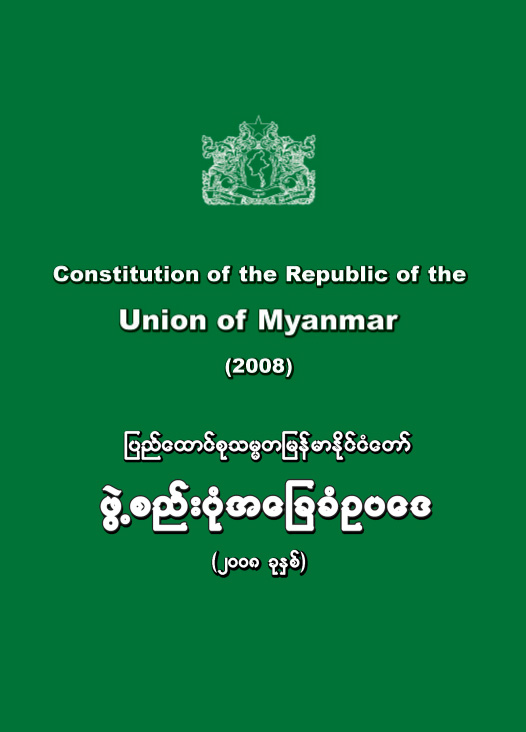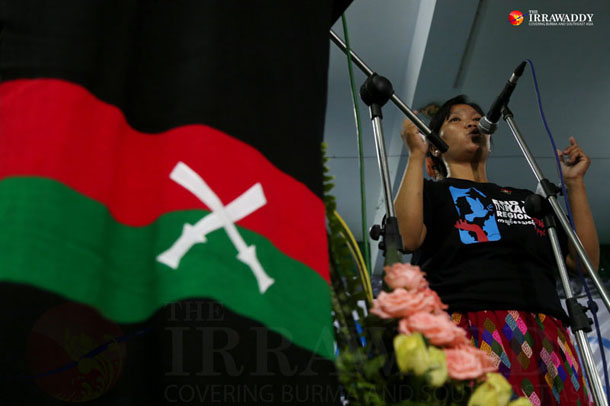124 search results found for "same impunity"
High-level Intimidation of Chin Women Activists Exposes Systemic Impunity for Military Rape
On June 10, 2014, a soldier from Burma Army Light Infantry Battalion no. 269, stationed at Razua, in Matupi Township, Chin State, attempted to rape a local Chin woman, aged 54, badly injuring her. When the police handed over the perpetrator, Myo Thura Kyaw, to the Razua military base, many local people worried that proper justice would not be served. They began questioning his whereabouts and demanding transparent prosecution under a civilian court. In a similar case last year, a soldier from the same base who had attempted to rape a 14-year-old girl was let off without punishment […]
| |11-17 February: Same Constitution, Same Problems
The full text of this week’s issue of Weekly Highlights, including an analysis of current events and news highlights from inside Burma, the region and internationally, as well opinion pieces, actions, statements, press releases and reports from Burma groups and relevant actors.
|Same Constitution, Same Problems
 The Special Rapporteur on the Situation of Human Rights in Myanmar, Tomás Ojea Quintana, finished his 7th visit to Burma on Saturday and his report highlights the grave human rights concerns in Burma today. The escalation of conflict in Kachin State, communal violence in Arakan State, the continuing detention and torture of political prisoners, land confiscation due to development projects, restrictions on freedom of association and assembly are among the poor human rights conditions stated in his report. The scale of such human rights violations, in spite of the reforms initiated by the government, emphasizes the necessity of the role of the Special Rapporteur.
The Special Rapporteur on the Situation of Human Rights in Myanmar, Tomás Ojea Quintana, finished his 7th visit to Burma on Saturday and his report highlights the grave human rights concerns in Burma today. The escalation of conflict in Kachin State, communal violence in Arakan State, the continuing detention and torture of political prisoners, land confiscation due to development projects, restrictions on freedom of association and assembly are among the poor human rights conditions stated in his report. The scale of such human rights violations, in spite of the reforms initiated by the government, emphasizes the necessity of the role of the Special Rapporteur.
Many of the human rights violations that Quintana reported have a direct obstacle in the path of correcting these abuses: the 2008 Constitution. The 2008 Constitution was written by the military without Daw Aung San Suu Kyi and the National League for Democracy or genuine representation from Burma’s ethnic areas. It was described by the 88 Generation Students Group as a “sham constitution” and through corruption, fraud and intimidation, the ruling junta outrageously claimed that 92% of the people who voted ratified the document […]
Now is the Time to Act, Sexual Violence Must End in Burma
 On 10 June 2014, the Burma government prepared to sign the ‘Declaration of Commitment to End Sexual Violence in Conflict’ at the end of a three-day global summit, which aimed to “shatter the culture of impunity for sexual violence in conflict.” On the same day, a woman was brutally beaten by a Burma Army soldier during an attempted rape in Rezua, Chin State. The eyewitnesses who spoke to the Chin Human Rights Organization said that the women was held down by the soldier, while he repeatedly beat her. She was rushed to the hospital and is fortunately now in recovery.
On 10 June 2014, the Burma government prepared to sign the ‘Declaration of Commitment to End Sexual Violence in Conflict’ at the end of a three-day global summit, which aimed to “shatter the culture of impunity for sexual violence in conflict.” On the same day, a woman was brutally beaten by a Burma Army soldier during an attempted rape in Rezua, Chin State. The eyewitnesses who spoke to the Chin Human Rights Organization said that the women was held down by the soldier, while he repeatedly beat her. She was rushed to the hospital and is fortunately now in recovery.
However, this brutal event has lead to a series of demonstrations in Rezua and Matupi, Chin State this week, calling for an end to sexual violence. According to The Irrawaddy, protesters held placards that stated: “Stop raping; We are humans, not animals. We are humans, not property.” Though the organizers requested to hold the rally, the local police denied their applications and they have been arrested for staging a peaceful demonstration without permission, ironically under the Peaceful Assembly and Peaceful Procession Law.
This recent case of attempted rape is not a one-off incident of a rogue Burma Army soldier. A report produced by Women’s League of Burma (WLB) ‘Same Patterns, Same Impunity’ demonstrates how the sexual violence inflicted by the Burma Army soldiers are systematic in nature and a part of a wider structural system of politicizing women’s bodies and abusing them as instruments of war and oppression. The data collected by WLB and its members found that since the 2010 elections, over 100 cases of rape has been documented, of which 47 were brutal gang rapes and victims were as young as eight years old. Most of the documented cases were linked to Kachin and Northern Shan State where military offensives have been taking place since 2011, indicating that rape and sexual violence is in fact, used as a weapon in an attempt to demoralize the ethnic communities and to assert dominance over them […]
| |Three Years of Suffering for the Kachin People, How Much Longer?
 As we pass the marking of the third year of the conflict in Kachin and northern Shan State between the Kachin Independence Army (KIA) and the Burma Army, it is difficult not feel pessimistic. A report released by Fortify Rights, a non-profit human rights organization based in Southeast Asia, highlights the continuing torture of Kachin civilians by Burmese security forces, while Kachin Women’s Association Thailand (KWAT) expressed their concern at the increasing offensives on KIA positions. Peace talks have occurred sporadically in an attempt to resolves the conflict, but still, all we see is the continuing persecution of Kachin communities.
As we pass the marking of the third year of the conflict in Kachin and northern Shan State between the Kachin Independence Army (KIA) and the Burma Army, it is difficult not feel pessimistic. A report released by Fortify Rights, a non-profit human rights organization based in Southeast Asia, highlights the continuing torture of Kachin civilians by Burmese security forces, while Kachin Women’s Association Thailand (KWAT) expressed their concern at the increasing offensives on KIA positions. Peace talks have occurred sporadically in an attempt to resolves the conflict, but still, all we see is the continuing persecution of Kachin communities.
The Fortify Rights report, ‘Myanmar: End Wartime Torture in Kachin State and Northern Shan State’ demonstrates how torture, both physical and mental, has been systemically inflicted upon Kachin civilians thought to be associated with the KIA. Fortify Rights believes that this constitutes war crimes and crimes against humanity. The perpetrators include not just the Burma Army, but also military intelligence and the police force. Beatings during interrogation, cutting off blood circulation, deprivation of food, drink, and sleep, sexual assault, and stabbings among other methods were all documented. Mental torture was also used, such as forcing prisoners to dig graves and telling them it is their own, having to drink from pools of their own blood and being put in execution style positions. This report comes just a few months after the Women’s League of Burma released, ‘Same Patterns, Same Impunity’ that exposes the systematic use of rape and sexual assault as a weapon of war by the Burma Army in ethnic areas […]
| |Systematic Sexual Violence in Burma’s Ethnic Areas: New Report
Today marks the launch of an important new report documenting ongoing crimes of sexual violence-over 100 cases documented since 2010, including 47 gang rapes–perpetrated by the Burmese military in ethnic regions of Burma.
The Women’s League of Burma (WLB), consisting of thirteen women’s organizations representing different ethnic areas in Burma, released the report, “Same Impunity, Same Pattern: Sexual abuses by the Burma army will not stop until there is a genuine civilian government, “and is urging an immediate end to these atrocities […]
| |The Burma Government Must Stop Condoning Sexual Violence in Conflict Areas
 On 5 June 2015, Burma Campaign UK released a briefing paper that illustrated the Burma Government’s lack of action towards eliminating sexual violence since it signed the Declaration of Commitment to End Sexual Violence in Conflict (the Declaration) last year. As a signatory to the declaration, Burma agreed to prioritize prevention of sexual violence and to hold all perpetrators accountable to the full extent of the international law, amongst other related commitments.
On 5 June 2015, Burma Campaign UK released a briefing paper that illustrated the Burma Government’s lack of action towards eliminating sexual violence since it signed the Declaration of Commitment to End Sexual Violence in Conflict (the Declaration) last year. As a signatory to the declaration, Burma agreed to prioritize prevention of sexual violence and to hold all perpetrators accountable to the full extent of the international law, amongst other related commitments.
Unfortunately, not only has Burma ignored its commitments to the Declaration, it is also actively violating it, as cases of rape and sexual assault continue to emerge from conflict areas. According to Burma Campaign UK, “Given the widespread nature of sexual violence by the Burmese Army, the refusal to act, and now the violation of commitments made in the Declaration, it can only be concluded that the use of rape and sexual violence by the Burmese Army is condoned at the highest level of the government and the military.” […]
| |‘If they had hope, they would speak’: The Ongoing Use of State-Sponsored Sexual Violence in Burma’s Ethnic Communities
In January 2014, the Women’s League of Burma (WLB) published a report which demonstrated the systematic use of rape by the Burma Army as a strategy to subjugate communities across the country. We documented over a hundred cases of sexual violence in the years since President Thein Sein took office – a number which we believe grossly underestimates the true scale of the problem. Drawing on evidence gathered by our member organisations across Burma, we argued that there are clear links between militarisation, investment and human rights abuses. We also proposed a number of steps to uproot the culture of impunity which surrounds sexual violence, and prevents survivors from obtaining justice. Whilst recent months have seen positive action taken in several areas, the pillars which provide impunity for perpetrators of human rights abuses remain in place. In January, we called for constitutional reform to place the military under civilian control; the establishment of effective judicial and non-judicial mechanisms to investigate human rights abuses, particularly those relating to sexual violence, and; greater participation of women in the peace process dialogue. […]
| |23 – 29 June: Now is the Time to Act, Sexual Violence Must End in Burma
The full text of this week’s issue of Weekly Highlights, including an analysis of current events and news highlights from inside Burma, the region and internationally, as well opinion pieces, actions, statements, press releases and reports from Burma groups and relevant actors.
|Women From Burma Delegation Speaks In British Parliament
A delegation of women from Burma will speak at a meeting in the British Parliament today. They will be speaking about the ongoing use of rape and sexual violence by the Burmese Army, as well as the situation in Kachin State highlighting the ongoing military offensive and humanitarian assistance for IDPs, Karen and Shan State, refugees return, the peace process and new laws restricting freedom of autonomy to choose the religion and women’s rights […]
| |









 All posts
All posts